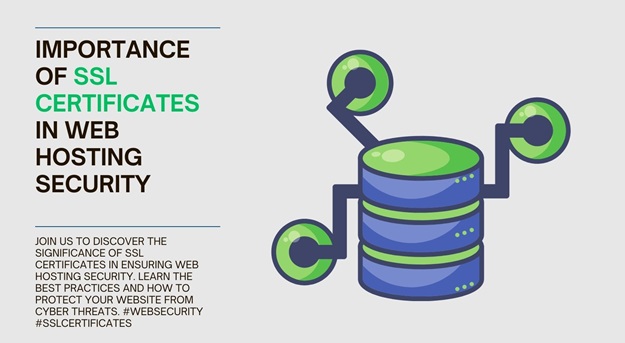In a digital world that is constantly changing, in which every click, swipe, and tap creates data, the security of the information shared over the internet has become paramount. Website owners must protect their online presence from cyber threats that are becoming more sophisticated. SSL certificates are a vital part of web hosting security. They act as bulwarks against cyber threats. In this article, we will explore the importance of SSL certificates, their impact on hosting security, and why website owners should prioritize their implementation in this article.
Understanding SSL Certificates
SSL (Secure Socket Layers) are cryptographic protocols that establish a secure link between a server web and the web browser of a user. They encrypt data sent between the two ends, preventing unauthorized entry and tampering. SSL certificates are issued after the Certificate Authorities (CAs), which verify the identity of website owners, have verified the validity of the certificate.
5 Signs It’s Time to Upgrade Your Web Hosting Plan
Installed on a server, SSL activate HTTPS, which indicates a secure connection for visitors.
SSL certificates are important for web hosting security
- Data encryption SSL certificates encrypt sensitive data such as login credentials and payment details before transmission. The encryption makes intercepted information unreadable for cybercriminals and thwarts their attempts to steal valuable data.
- Trust & Credibility Websites with SSL certificates show a padlock and HTTPS in their address bar to assure visitors that the connection is secure. This visual cue increases trust and credibility for websites that handle sensitive information and e-commerce.
- Protection Against Cyber Attacks SSL certificates protect against cyber attacks such as man-in-the middle attacks where attackers intercept communication between a client and a server. SSL certificates encrypt data to prevent malicious actors from intercepting or altering sensitive information.
- Search engines such as Google prioritize secure websites when ranking search results. SSL-certified websites receive a small ranking boost. This makes SSL not only an important security measure, but also a SEO strategy for improving visibility and organic traffic.
- Compliance requirements: Many regulations, including the Payment Card Industry Data Security Standard PCI DSS and the General Data Protection Regulation GDPR, mandate the use SSL certificates to protect data. It is important to comply with these regulations in order to avoid hefty fines, and maintain the trust of your customers.
- Improved User Experience Secure websites load quicker and offer a seamless browsing environment. SSL certificates improve website performance through HTTP/2 protocol, which is more efficient and reduces latency.
- Protection against Phishing: SSL Certificates help to prevent phishing by verifying authenticity of websites. When the HTTPS address bar is accompanied by the padlock symbol, users are less likely fall for fraudulent websites that pose as genuine ones.
Types of SSL certificates
There are different types of SSL to meet the security and organizational needs.
- Domain Verified (DV) Certificates These certificates confirm the ownership of a domain. They are usually issued quickly and for a lower price. These certificates are ideal for small businesses, blogs and informational sites.
- Organization Verified (OV) Certificates : OV Certificates require a more rigorous validation process, including the authentication of an organization’s identities. These certificates are perfect for e-commerce sites and businesses that value trust and credibility.
- Extended Verification (EV) certificates : The EV certificate offers the highest level validation. It requires thorough verification of an organization’s legal existence and its operational identity. Websites that display EV certificates in the address bar instill greater confidence to visitors.
- Wildcard Certificates: Wildcard certifcates secure a domain as well as all of its subdomains. They are a cost-effective option for businesses that have multiple subdomains.
- Multidomain Certificates (SAN). Multidomain certificates are a convenient way to secure multiple domains or subdomains with a single certificate. This is incredibly useful for companies managing diversified web properties.
Best Practices for Implementing SSL Certificates
- Select the Right Certificate: Choose an SSL that meets your budget and organizational requirements. When making a decision, consider factors like the validation level, warranty and support.
- Update Certificates SSL certificates expire after a period of time, usually between one and two years. To avoid service interruptions and to maintain continuous protection, ensure that certificates are renewed on time.
- Enable https everywhere: Secure your entire website, not just the sensitive pages like checkout or login pages. This ensures that your web presence is secure and consistent.
- Monitor SSL Certificate Health: Ensure that SSL certificates are regularly monitored to identify any vulnerabilities or issues. Automated tools that monitor the status of SSL certificates can streamline this process, and send real-time notifications.
- Implement Content Security Policy: Complement SSL certificates with additional measures of security, such as CSP, to mitigate the risks associated with injection attacks and cross-site scripting.
- Educate users: Educate visitors on the importance of HTTPS, and how to recognize secure connections. Give clear messages and guidelines to promote confidence and safe browsing.
Conclusion
SSL certificates are a cornerstone in web hosting security. They protect sensitive data, enhance trust, and mitigate cyber threats. SSL protects users from unauthorized access, tampering, and eavesdropping by encrypting the communication between web servers. SSL is a must-have for website owners to strengthen their online presence and comply with regulatory requirements. They also foster visitor trust. The right SSL, coupled with best practices, can help websites create a seamless and secure browsing experience for their users.

